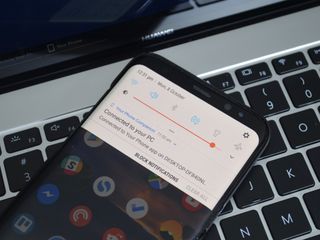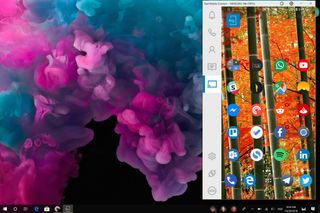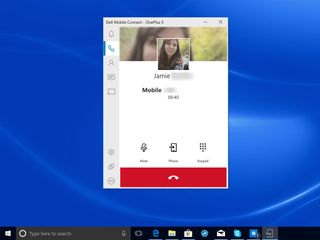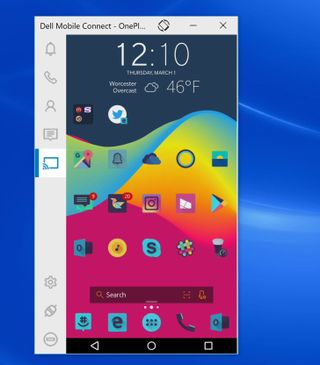Dell Mobile Connect puts Microsoft's Your Phone to shame
Many companies strive to let you connect your phone to your PC, but Dell is beating Microsoft in the quest to merge PC and mobile.

Microsoft's Your Phone app allows you to sync your text messages and photos between your phone and your Windows 10 PC. As good as it is to be able to text message from your PC, Your Phone has stikoff competition from Dell Mobile Connect which recently became available on non-Dell devices.
Previously exclusive to specific Dell hardware, Dell Mobile Connect relays text messages as well as phone calls. It also mirrors the entire Android phone experience to your PC.
Dell Mobile Connect is available for free on Windows 10 and requires a free companion app on Android. While it isn't perfect, in many ways it puts Your Phone to shame.
It's worth noting that it may have been a mistake by Dell to release the app to all devices and it may be made exclusive once again or made not work on all hardware. But this article focuses on the concept behind Dell Mobile Connect rather than reviewing it.
The full experience

Dell Mobile Connect bridges the gap between a phone and PC in a better way than almost any app. It syncs text messages, relays phone calls, and mirrors apps from your phone. In my time with it, I could just leave my phone charging on my night stand and have all the functionality of my phone at my desk.
While I don't think Dell Mobile Connect is perfect, it is an excellent peek into the vision that I think Microsoft has, a day where you could leave your phone somewhere and not miss a beat. You could have an Always Connected PC and leave your phone in your bag or not even have to take your phone out at the office. In some sense, this is already possible and working well with Dell's efforts and I suspect it will get better with time.
Get the Windows Central Newsletter
All the latest news, reviews, and guides for Windows and Xbox diehards.
Still imperfect

While Dell Mobile Connect provides a larger feature set than its competition, it isn't perfect. It requires a Bluetooth connection rather than just WiFi. That isn't a major drawback in my opinion but it is one more connection that you have to leave running. It also requires your phone screen to be on to mirror apps, though it's now dimmed thanks to a recent update.
It also looks much better in a small window than taking up your entire screen. If you just wanted to use it to send a text message from your PC, you may prefer the design of Your Phone that feels native on larger screens.
It also doesn't integrate with things like the Windows 10 notification center which extends the feeling that it isn't a native experience. In my opinion, using Dell Mobile Connect feels a bit like using Android and your phone on top of Windows 10 rather than inside of it.
Lastly, app mirroring looks good sometimes but can be laggy or glitchy at other times. It also struggles to connect at times. This could be hardware related though since my PC isn't made by Dell.
Why it puts Your Phone to shame

Updated: This conclusion had been edited to clarify the technical differences between the two pieces of software.
What Dell Mobile Connect delivers and the concept behind it puts Your Phone to shame. App mirroring and call relaying are important features that make Dell Mobile Connect much more complete when it comes to letting users leave their phones in their pockets.
The feature gap is a result of technical differences between how Dell and Microsoft approach connecting phones and PCs.
Dell is only licensing its app from a third-party company. That means others like ASUS are also shipping their own branded versions of this Connect app with their laptops.
The core difference between apps stems from the types of connections used. Dell relies on Wi-Fi Direct, which uses Bluetooth to initiate the pairing but actual data is transferred directly over Wi-Fi from your phone to the PC without the need for a Wi-Fi network. That means you can use Dell Connect anywhere without the need for internet. That's not only convenient, but it's also much more secure; information is encrypted and not flowing onto a public network.
Microsoft does not use Wi-Fi Direct and instead relies on a network-based system because it makes its app available on more devices. Not all laptops or phones play nicely with Wi-Fi Direct, including older hardware or even older versions of Android. Microsoft's method, while not as powerful, works everywhere on every device, without any unique requirements. That choice has tradeoffs, but Microsoft is trying to make its service ubiquitous instead of targeted.
These technical differences are noteworthy but the fact remains that users who use Dell Mobile Connect have a more complete experience compared to those who use Your Phone.
Microsoft has a history of playing catch up with third-party developers; for example, Night Mode came after f.lux. I hope that Microsoft is looking at Dell to gain inspiration for merging mobile and PC.

Sean Endicott brings nearly a decade of experience covering Microsoft and Windows news to Windows Central. He joined our team in 2017 as an app reviewer and now heads up our day-to-day news coverage. If you have a news tip or an app to review, hit him up at sean.endicott@futurenet.com.
